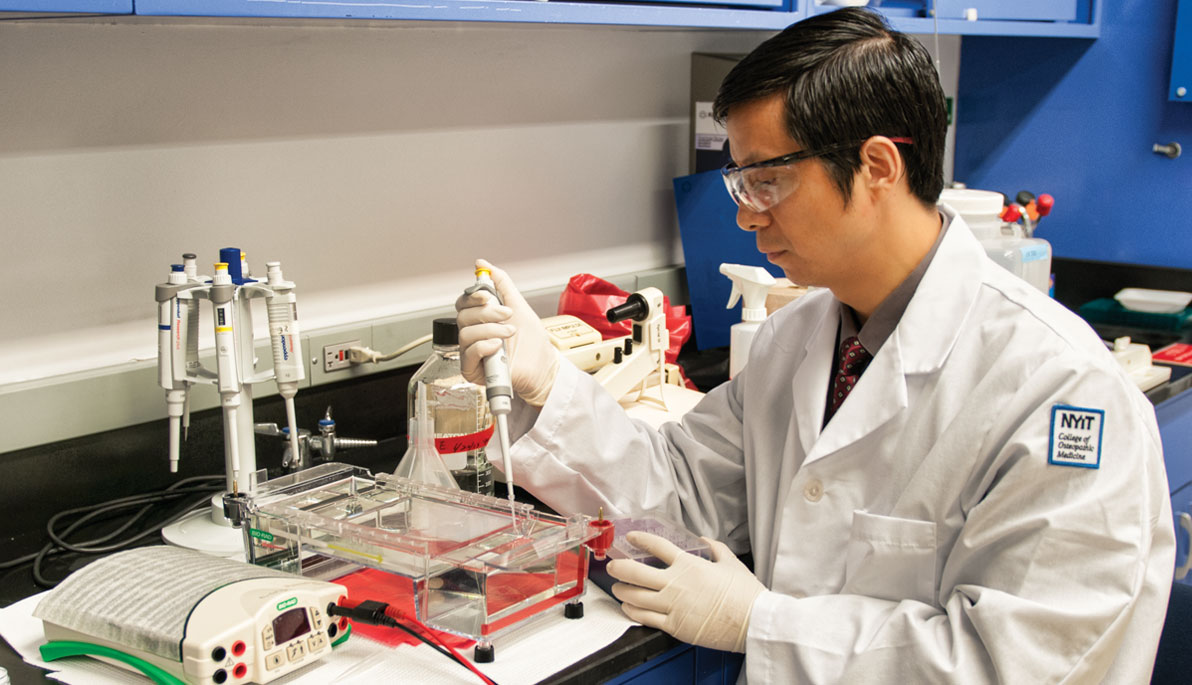
NYIT Scientist Shares His Latest Heart Research
February 12, 2015
NYIT College of Osteopathic Medicine Associate Professor Qiangrong Liang, Ph.D., won a National Institutes of Health (NIH) grant last year to study the effects of reducing caloric intake on the heart. As part of American Heart Month in February, The Box asked Liang about his research.
What's the latest update on your research?
My research is focused on heart failure, a fatal disease condition seen in virtually all cardiovascular diseases. Caloric restriction is a robust dietary intervention known to delay aging and heart disease and prevent or reduce heart failure. In my laboratory, I am attempting to identify the key cellular and molecular mechanisms responsible for protecting the heart when a person reduces his or her caloric intake.
What are you hoping to discover?
We have developed a method, in the mouse heart, to monitor the efficiency of mitochondria-the power plant of cells. We are asking: can caloric restriction enhance the quality of cardiac mitochondria as a way to protect the heart?
We expect to confirm that mitochondria in the heart function more efficiently during caloric restriction. We also hope to identify the underlying mechanism responsible for the enhanced mitochondrial efficiency in the heart. If we can identify those mechanisms, perhaps drugs can be developed to harness the benefits of caloric restriction without the need to reduce food consumption.
Why are you interested in cardiac research?
I embarked on cardiac research more than 20 years ago when I was in graduate school, and my interest in heart research grew steadily. Given what we face today, I am glad that I followed this path. Heart disease is the No. 1 killer—not only in the United States but also in the rest of the world. According to the Centers for Disease Control and Prevention (CDC), more than 5 million Americans suffer from heart failure, a severe disease that is curable only by heart transplantation. About half of those who develop heart failure die within five years of diagnosis. Heart failure costs the nation an estimated $32 billion each year. Researchers like me can help fight heart disease by conducting studies that may lead to effective drug development for these conditions.
What are some of the big "unanswered questions" that you would like to explore further with your research?
Alternate day fasting has been shown to protect the heart equally well. Does it protect the heart through the same mechanism as caloric restriction? What are some of the specific pathways that may facilitate the beneficial cardiac effects of caloric restriction? Is mitochondrial quality control really essential for caloric restriction to protect the heart? Answers to these questions will help us gain insight into the mechanism of caloric restriction. We can then find ways to design effective drugs to harness the power of caloric restriction for preventive and therapeutic intervention of heart disease.
For more about NYIT faculty conducting NIH-funded research, read the Winter 2015 issue of NYIT Magazine.
More Features

An Alumnus’ Commitment to the Environment
As an energy management graduate from New York Tech’s Vancouver campus, Jasdeep Gulati (M.S. ’22) is highly invested in educating people about environmental and climate sustainability.

Vancouver Faculty Win University-Sponsored Research Awards in New Program
The new Global Impact Research Grant (GIRG) program has been developed to keep Vancouver-based faculty connected to faculty and research projects being conducted on the university’s New York campuses.

Studying Climate Change One Degree at a Time
Junhua Qu (M.S. ’24) began her collegiate journey in Beijing. But, her interest in climate change took her to New York Tech’s Vancouver campus to study energy management.